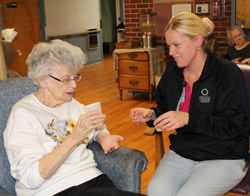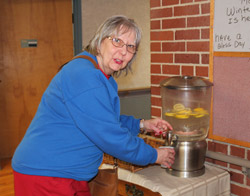


A spa day and a glass of Merlot was all it took.
A Chapel Hill Community resident in Canal Fulton, Ohio, with dementia who often lashes out and declines to bathe agreed to a day of pampering: a bath, time at the community’s salon, and a glass of red wine after staff told her she won a gift certificate.
It’s all about the right approach and the right person to provide care. Inspired by recent Comfort Matters dementia care training, staff tried something new: providing her and others with things that bring comfort.
Comfort Matters was developed at Beatitudes Campus in Phoenix, Arizona, another member of the Council for Health and Human Service Ministries of the United Church of Christ. Comfort Matters follows five ideas: comfort care, anticipating patient needs, knowing the person, person-directed care, and staff empowerment.
Since receiving training, Chapel Hill has added snack stations. “At home, we can access the fridge or the pantry whenever we want. It seems so simple, but we want to give them as much independence as we can,” Caroline said.
Staff also contacted residents’ families and learned personal information about them and now track what soothes them. “Residents with dementia who are in pain can’t always communicate. Staff members look at facial expressions, sounds, and nonverbal (communication)” Chapel Hill Executive Director Debbie Durban said.
Tena Alonzo, director of education and research at Beatitudes, said comfort care is often common sense. “It’s about understanding dementia and understanding the person,” Tena said.
Chapel Hill launched Comfort Matters in June. United Church Homes will offer it at Trinity, Parkvue and Fairhaven communities this year. Amy Kotterman, director of hospitality services, said the training has paid off.
“The program is person-directed care. We’re focusing on the individual and not focusing on the disease,” Amy said. “The more you know about the resident, their past, what makes them who they are, we’re better able to care for (them). ”Ron and Marie Cleary are pleased with the initiative. Ron’s mother, Shirley, who has dementia, was aggressive before moving to Chapel Hill about three years ago. Staff regulated her medication, the Clearys said, and have asked for personal information to provide better care for her. “When the staff has more information, it’s an opportunity to connect and see more life come back into her eyes,” Marie said.
